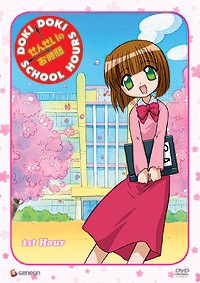
Sometimes, all it takes is a really catchy opening song and video to get one’s attention. Dazzled by the bright, happy visuals and cheery tune, you find yourself drawn to watching the show. It’s a shame when the show turns out to be crap.
This is the case with Doki Doki School Hours, which twenty years ago was adapted into an anime series by JC Staff, based upon the original four-panel comic by Tamami Momose. I cannot say anything about the source material, since I’ve never read it. What I can say about the anime series is…that it has not left a very cheerful memory of itself twenty years later.
The premise seemed promising enough at first glance: Mika Suzuki is the homeroom teacher to a group of eccentric high school students. Nothing new and unusual, all too common in anime really. Many a decent lightweight comedy has been set in the same milieu. The joke is that Mika-sensei, who is supposed to be 27 years old, looks like she might be about 13, at most. Frankly, she looks closer to 10, but the character design for her is not particularly realistic so it’s hard to tell. This being anime, of course one of the female students (Kitagawa) looks like she is 27 and she happens to be the one who has a strong sexual attraction to Mika-sensei, which is played for laughs. We see Kitagawa attempt to cuddle the diminutive instructor and cajole her into various costumes. This is all supposed to be very funny. You’re laughing, right? Right?……………right?
I don’t hear you laughing and I’m not surprised. While a lot of the elements for a school comedy are there, for some reason they never manage to ignite laughter. The show has very good intentions to be humorous in many different ways, but you know what they say about good intentions. Yes, watching this show can be a version of Hell, specifically the Hell of Boringly Repetitive Jokes. I’m not sure why some comedy writers think this is so, but many of them appear to believe that if a joke is funny once, it can be recycled endless times with the same impact (and this is not a uniquely Japanese phenomenon; think of any number of stale, repeated jokes that have appeared on Saturday Night Live over the decades, jokes that were funny the first two, perhaps three times, but which made you hurriedly reach for the remote when they appeared for the fifteenth time. That very same season. Twice last week). Sadly for many comedy writers, you cannot keep drawing endlessly from the same well. While mileages will always vary with comedy, I think most people would agree that novelty, the sense that a piece of humor has not yet been recycled into tedious familiarity, is an important component to a joke’s impact. You can repackage a joke to give it the flavor of novelty again, but that works only until that feeling of tedious familiarity returns.

The writers of the Doki Doki School Hours seem blissfully unaware of this obstacle to achieving the grail of humor unending. The same jokes are repeated again and again and again and again. I could continue writing “again and again” for a full page, but I’ll spare you some of the horror I went through watching this show almost twenty years ago when Geneon released it here on home video. I should have taken warning from the way that home video release panned out, as there was a serious defect with the third single volume of the release, with episode 9 having de-synched audio. It may be the anime no kami were trying to send me, really all of us, a message. But did we listen?
Good for you if you did, passing on this release altogether. Sadly, I did not. I went ahead and bought all five singles of this turkey and sat through it all. More the fool me. The first volume was mildly amusing. I may not have been as entertained as I was by other comedies, but I thought it good enough to continue with the next installment. The second volume, I already began to tire rather seriously of Kitagawa pawing at Mika, Kobayashi constantly fretting over her weight, Suetake being dumb and Kudo having nosebleeds over Suetake acting dumb. Now, many years later, the stupidities all begin to blend together in one’s memory to the point that I forget many of the other uninteresting characters, except that there was a standard-issue otaku in there as well, Watabe, the would-be manga creator. The only gag involving him I now recall was that he had an annoying fan girl, Nakayama, who constantly whined at him. Now, I can’t quite recall why I continued to buy the show, other than some foolish feeling about filling the box. I can tell you one thing: I have long since removed and thrown away any and all “completionist” urges I once had and it may be that this show was one of the things which led me to reject all such notions. Now, I happily buy only parts of things I like and have no care or worry about mismatched packaging. In that sense, perhaps I owe a tiny debt to DDSH for helping to release me from the shackles of foolish naivete, the compulsion to “have it all.”
The mind unconsciously engages in waste removal at times, so I can’t really recall too much more about this boring, lazily written, poor excuse for a comedy. It might also be that while I was physically present during the times when the disc was in my DVD player of that era, my mind was already drifting elsewhere within a few moments of passing that siren song of an opening, can/goo’s Oshieteageru (“I Will Tell You”). Perhaps that is why I felt so well rested after “viewing” every later volume of this series.
It did not help, as a dub listener, that the show’s dub was one of the poorer efforts from The Ocean Group’s Calgary outfit, Blue Water Studios. Blue Water does not get much praise from dub fans to start, but this effort did nothing to dispel their poor reputation. The dub lacks any sense of life, with performances that just sort of hang there, empty of emotion and impact. In many ways, it’s the perfect dub for this show, since the show lacks life and energy. For those out there thinking “well, then you should listen to it in the original and hear how it was meant to be heard,” you’re barking up a tree that’s been stripped bare of its bark and burnt to hollow ash. I’ve listened to the original Japanese track, which boasts a roster of respectable seiyuu, several of whom are still recognizable names continuing to work in the industry. The original performances also lack energy and any feeling of life. I was in fact taken aback by how incredibly dull those performances were as well. Maybe that, too, was a sign?
The old actor’s adage goes “Dying is easy. Comedy is hard.” In this case, it was made that much harder by repeating the same jokes, relentlessly and without any attempt at freshening them up, on a regular basis. You could predict them as they were about to be delivered. Deliver yourself from the evil of the Hell of Boringly Repetitive Jokes. Go watch/rewatch Azumanga Daioh instead. Sure, it repeats jokes as well, but at least it attempts to repackage them. More importantly, it’s funny.




